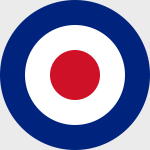Hobby Master HA8326 RAF Supermarine Spitfire Mk. IXe Fighter - ML407, Flight Officer Johnnie Houlton, No.405 (New Zealand) Squadron, France, September 1944 (1:48 Scale) "My Spitfire was in a mess. Cannon shells had blasted a couple of large holes in the side. One had burst against the radio and armour behind my seat. Another, having made a hole the size of a football, had torn the control wires to shreds. The elevator was hanging by one thread of frayed wire and my rigger neatly snapped this with a sharp blow from his fingers. "You will not be needing that any more," he grinned at me. "It all looks very untidy - doesn't it?" Another cannon shell had torn big pieces out of the elevator and rudder surfaces."
- Group Captain W. Duncan-Smith
 The Spitfire is the most famous British aircraft of all time. Although less numerous than the Hawker Hurricane, it is remembered as the sleek, thoroughbred fighting machine that turned the tide during the Battle of Britain. The Spitfire was among the fastest and most maneuverable prop-driven fighters of World War II, serving in virtually every combat theater.
The Spitfire is the most famous British aircraft of all time. Although less numerous than the Hawker Hurricane, it is remembered as the sleek, thoroughbred fighting machine that turned the tide during the Battle of Britain. The Spitfire was among the fastest and most maneuverable prop-driven fighters of World War II, serving in virtually every combat theater.
Supermarine designer Reginald Mitchell created this small, graceful, elliptical-wing fighter with eight guns in the wings that were able to fire without being hindered by the propeller. The immortal Spitfire thus became not merely one of the best-performing fighters of all time, but also one of the best-looking. Although never employed as a long-range escort, the Spitfire was a champion in an air-to-air duel. Spitfires routinely dived at the speed of sound, faster than any of the German jets.
A carrier-based version, called the Seafire, was a winner in its own right, serving valiantly on convoy routes during World War II. The Seafire 47 was even used in the early stages of the Korean War, before it was replaced by more modern jet aircraft.
Pictured here is a 1:48 scale replica of a RAF Supermarine Spitfire Mk. IXe fighter that was piloted by Flight Officer Johnnie Houlton, who was attached to No.405 (New Zealand) Squadron, then deployed to France during September 1944. Sold Out!
Dimensions:
Wingspan: 9-inches
Length: 7-1/2-inches
Release Date: June 2023
Historical Account: "Kiwi" - John Arthur Houlton DFC (September 23rd, 1922 - April 16th, 1996) was a New Zealand flying ace of the Royal New Zealand Air Force (RNZAF) during the Second World War. He was credited with the destruction of at least five German aircraft.
Born in Christchurch, Houlton joined the RNZAF in June 1941 and, after completing training in New Zealand, was sent to England to serve with the Royal Air Force. After a brief period of service with No.485 (NZ) Squadron, he volunteered to go to Malta as part of the island's aerial defense. He was based there from August to December 1942 before returning to Europe and No.485 Squadron. He shot down a German bomber on the day of the Normandy landings, often considered to be the first German aircraft destroyed during the invasion of France. After the war he stayed in the RNZAF and later took up commercial flying. He died in 1996, at aged 73.






![Imperial Japanese Navy Kyushu J7W1 Shinden Fighter [With Collector Magazine] (1:72 Scale)](http://cdn4.volusion.store/qh9e9-jdqv9/v/vspfiles/photos/DAWF23-1.jpg?v-cache=1740197136)
